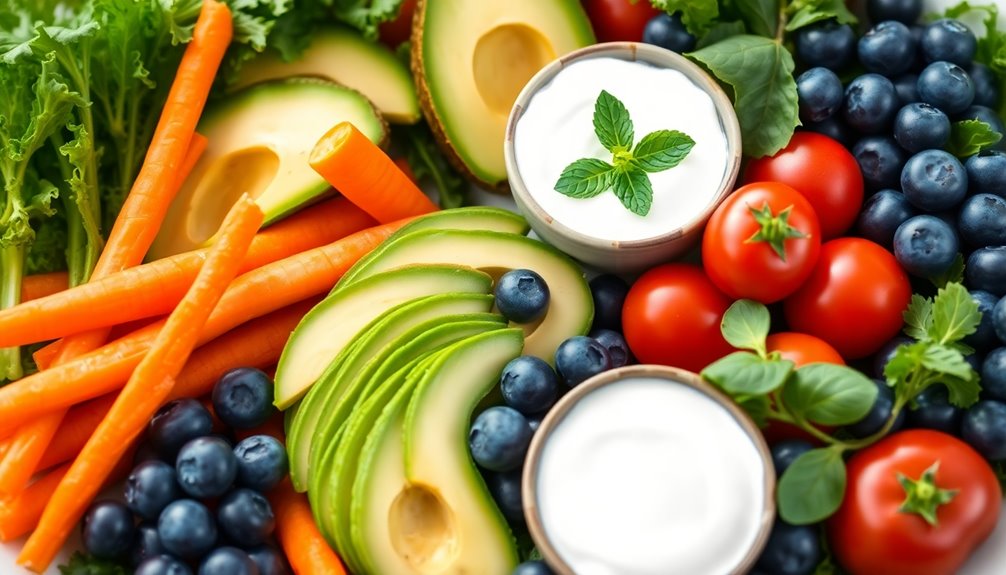The Autoimmune Protocol (AIP) Diet is designed to help you reduce inflammation and support healing if you have autoimmune conditions. It focuses on eating nutrient-dense foods like vegetables, fruits, fish, and healthy fats while eliminating inflammatory triggers like grains, dairy, and legumes. This approach enhances gut health, boosts cognitive function, and may improve your autoimmune symptoms. Meal planning and support from communities can increase your chances of success, especially during the initial adjustment period. By following the AIP Diet, you create a balanced environment for your body to thrive, paving the way for better health outcomes. There's more to discover about this diet's benefits and strategies.
Key Takeaways
- The AIP Diet focuses on reducing inflammation and improving symptoms in autoimmune conditions through nutrient-dense foods.
- It emphasizes consuming vegetables (excluding nightshades), fruits, fish, healthy fats, and bone broth while avoiding grains, dairy, and legumes.
- Meal planning is crucial for AIP success, helping to ensure a diverse intake of compliant foods.
- Support from healthcare providers and communities can help navigate challenges and maintain motivation during the transition to AIP.
- The diet promotes gut health, enhances cognitive function, and helps identify food sensitivities for better overall wellness.
Understanding the AIP Diet

Understanding the AIP Diet starts with recognizing its purpose: to reduce inflammation and promote healing in individuals with autoimmune conditions. This dietary approach focuses on eliminating foods that may trigger inflammation or immune responses, allowing your body to heal more effectively.
The AIP diet is structured around specific AIP guidelines that help you identify which foods are beneficial and which ones to avoid. The AIP guidelines encourage you to prioritize nutrient-dense foods, including vegetables, fruits, healthy fats, and high-quality proteins. These foods not only support immune function but also provide essential vitamins and minerals that are often lacking in a standard diet. Additionally, adopting a plant-based diet can further enhance your health by providing a rich source of antioxidants and fiber.
In contrast, AIP restrictions eliminate potential inflammatory foods, which typically include grains, dairy, legumes, nightshades, and processed sugars. This cautious approach is aimed at creating a more balanced internal environment, allowing your body to recover from the stress of autoimmune disorders.
Foods to Avoid

When following the AIP diet, there are several key foods you should avoid to effectively manage inflammation and support your healing process. By steering clear of these common triggers, you can give your body a better chance to heal and thrive.
Here's a quick reference table to help you identify these foods and their alternative options:
| Foods to Avoid | Common Triggers | Alternative Options |
|---|---|---|
| Grains | Wheat, rice, corn | Sweet potatoes, cassava |
| Dairy | Milk, cheese | Coconut milk, almond milk |
| Legumes | Beans, lentils | Zucchini noodles, cauliflower rice |
Grains are a major source of inflammation for many, so it's best to avoid them entirely. Dairy products can be another common trigger, often leading to digestive issues and inflammation in those with autoimmune conditions. Eventually, legumes can also provoke adverse reactions, making it wise to eliminate them from your diet. Additionally, traditional bread consumption can contribute to inflammation and other health risks, further emphasizing the importance of avoiding these foods.
Instead of focusing on what you can't eat, consider the numerous alternative options available. Sweet potatoes and cassava can provide the starch you need without the inflammation. For creamy textures, coconut or almond milk are excellent substitutes for dairy. Zucchini noodles and cauliflower rice can serve as delicious alternatives to grains and legumes, helping you feel satisfied while adhering to the AIP guidelines. Embracing these changes can foster a sense of community and belonging among others on a similar journey.
Foods to Include

Incorporating nutrient-rich foods into your diet is crucial for healing and managing autoimmune conditions. The Autoimmune Protocol (AIP) emphasizes foods that support your health while eliminating potential triggers. Focus on including a variety of fruits, vegetables, healthy fats, and high-quality proteins to ensure you're nourished.
Start with leafy greens like kale and spinach, which are filled with vitamins and minerals. Brightly colored vegetables, such as carrots and bell peppers, provide antioxidants that help combat inflammation. Fruits like berries and apples are excellent choices, offering fiber and essential nutrients.
When it comes to protein, consider sourcing grass-fed meats, wild-caught fish, and pasture-raised poultry. These options aren't only rich in nutrients but also free from harmful additives.
Healthy fats from avocados, coconut oil, and olive oil support overall wellness and can aid in nutrient absorption.
Don't forget about incorporating bone broth into your meals. It's a fantastic source of collagen and amino acids, making it beneficial for gut health.
For those seeking AIP-friendly recipes, there are countless resources available that highlight delicious, nutrient-rich options tailored to your needs. Additionally, engaging in regular exercise, such as mini band workouts, can complement your dietary changes and enhance muscle tone and strength.
Experiment with different combinations of these foods to create satisfying meals that keep you energized. By focusing on these nutrient-rich options, you're not only fostering a sense of belonging within the AIP community but also taking meaningful steps toward improving your health and well-being.
Benefits of AIP

One of the primary benefits of the Autoimmune Protocol (AIP) diet is its potential to reduce inflammation and alleviate symptoms associated with autoimmune disorders. By focusing on nutrient-dense foods, AIP supports your immune system and promotes gut health, which is pivotal for overall well-being.
Research shows that many autoimmune conditions are linked to gut permeability and inflammation. When you eliminate inflammatory foods and introduce healing, nutrient-rich options, you create a balanced environment for your body. This can lead to significant improvements in symptoms, energy levels, and quality of life. Additionally, the AIP diet can enhance brain health, which is essential for maintaining cognitive function and overall health.
Here's a quick overview of the benefits you might experience on the AIP diet:
| Benefit | Description |
|---|---|
| Reduced Inflammation | Lower levels of inflammation can lessen symptoms. |
| Improved Gut Health | Supports a healthy gut microbiome and digestion. |
| Enhanced Nutrient Intake | Focus on nutrient-dense foods strengthens the body. |
| Better Immune Function | A balanced diet can improve immune responses. |
| Increased Energy Levels | Many report feeling more energetic on AIP.
Tips for Success

To navigate the Autoimmune Protocol (AIP) diet successfully, planning your meals and staying organized is crucial. Meal planning not only simplifies your grocery shopping but also ensures you have AIP-compliant foods readily available. Start by dedicating a day each week to organize your meals. Choose recipes that excite you and include a variety of vegetables, lean meats, and healthy fats. This diversity keeps your meals engaging and helps prevent nutrient deficiencies.
Next, stock your kitchen with necessary AIP ingredients. This includes items like coconut oil, bone broth, and a range of herbs and spices. Having these kitchen essentials nearby can make cooking less stressful and more enjoyable. Consider investing in high-quality storage containers to keep your prepped ingredients fresh, making it simpler to prepare meals during busy weekdays.
Don't overlook connecting with others following the AIP diet. Online communities and local support groups can offer valuable resources, recipe ideas, and encouragement. Sharing your experiences and challenges with others can nurture a sense of belonging, making the journey feel less isolating.
Lastly, be patient with yourself. Adjusting to the AIP diet can take time, and it's common to face obstacles along the way. Celebrate your achievements, no matter how small, and remember that every step you take is a step toward improved health. Following natural calorie cycles can also support your overall health during this transition. With dedication and the right tools, you'll find success on your AIP journey.
Frequently Asked Questions
Can the AIP Diet Cure Autoimmune Diseases?
The question of whether diets can cure autoimmune diseases often sparks debate. While some people report improved symptoms on the AIP diet, its efficacy varies among individuals. There's ongoing discussion about the AIP protocol controversies, highlighting the importance of more research.
It's crucial to approach dietary changes with caution and consult healthcare professionals to find what truly works for you. Remember, individual experiences can vary greatly, so stay informed and connected.
How Long Should I Follow the AIP Diet?
Studies show that nearly 60% of individuals find it challenging to adhere to strict dietary adjustments over a prolonged period. As you contemplate how long to follow the AIP diet, begin with an adjustment phase of at least 30 days to assess your body's reaction.
Subsequently, proceed to the reintroduction stage, where you can experiment with foods gradually. Keep in mind, long-term viability and addressing adherence obstacles are crucial for effecting enduring alterations for your well-being.
Is AIP Suitable for Children?
When considering if a diet's appropriate for children, you should prioritize children's nutrition and how it fits into your family's lifestyle. Many diets can be adjusted for kids, focusing on whole foods and balanced meals.
It's essential to make sure they get adequate nutrients while involving them in family meal planning. Consulting a pediatrician or nutritionist can help you customize the approach to meet your child's specific health needs without sacrificing taste or enjoyment.
Can I Exercise While on the AIP Diet?
Yes, you can exercise while on the AIP diet, but consider making some modifications. Pay attention to your energy levels, as your body's response to exercise may change during this time. Opt for low-impact activities like walking or yoga if you're feeling fatigued.
Listen to your body, and don't hesitate to adjust your routine based on how you feel. Finding what works for you is key to maintaining a balanced approach.
Are There Any Aip-Approved Snacks?
When you're searching for AIP-approved snacks, think of variety, convenience, and flavor.
You'll find AIP-friendly treats like homemade coconut energy balls, roasted sweet potato chips, and apple slices with almond butter.
These quick snacks not only satisfy your cravings but also fit your dietary needs.
Conclusion
To wrap up, the Autoimmune Protocol (AIP) diet can be an effective way to manage autoimmune conditions and promote overall health. Research shows that approximately half of individuals with autoimmune diseases experience notable symptom relief after adopting AIP for a short period. By grasping which foods to steer clear of and incorporate, and putting into action useful strategies for success, you can proactively move towards enhanced health. Keep in mind, your experience on AIP can result in enhanced well-being and energy.



